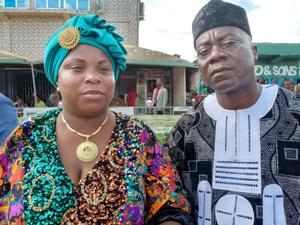The nation has spoken up! …Against galamsey!
It would be an exhibition of false modesty were I to fail to acknowledge that the Asantehene, Otumfoↄ Osei Tutu The Second, sent a very warm glow through my being when, at a meeting with the Asante House of Chiefs on December 15, 2022, he mentioned me by name and said he agreed with something I had written in one of my numerous articles about galamsey. (Please Google Youtube for the full report).
I was encouraged that the Asantehene, unlike some other influential people in Ghana, had not chosen to “see no evil, hear no evil and speak no evil” against galamsey. Since it’s been almost two years since the Otumfoↄ spoke, it might be sagacious to remind my readers of what he said, which was that:
QUOTE: [Yours Truly] “a seasoned journalist who writes articles in the newspapers— he said in one of his articles that he was surprised to hear that some Nananom [Chiefs] had said that they had ‘no power’ to stop galamsey.
“When I read it, I said, what he says is true, because if you, the chief, who has been given land to take care of, (say at Bekwai or Mampong) – you who now looks after all that land –if someone has come to that land and is doing galamsey on it, and you haven’t agreed to it, does it mean you have no power to say ‘No’ to him?
“Whereas, if someone had encroached on your borders and taken your land, you would swear The Great Oath of Otumfoↄ and bring him before me? So, as for this, Nananom, we are all in it. Whoever has galamsey on his land is involved in it. Whoever has land on which the water is being destroyed – someone has come to your land and is destroying the water your people drink – then, you are involved!
“So, you say [the destroyer of your people’s land] has a gun. Well, don’t go there. Come to Kumase and report it to me. Just as you would report to me, if someone swore the Great Oath. Come and tell me and I shall request the Regional Minister to send soldiers there. So, from now on, any chief who sits by and allows galamsey to take place on his land, we shall call him here and ask him, how is it that you sat there and allowed galamsey to take place on your land?
“If someone had signed a contract and come to show you a piece of paper and because of that, you allowed him to destroy your water and your land, then it means you know something about it. We shall institute a charge against you.
“These are days when the environment is being taken seriously at a global level. You all heard about what happened at the COP 27 conferences in Cairo. And we sit here and destroy our water and our land? From next year, we shall comb Asante’s lands. If there is galamsey is on your land, we shall ask you why. We shall ask ‘What do you rule the land for’? Your ancestors left it to you and you are watching it destroyed.
Why?” UNQUOTE
The Asantehene expressed the above sentiments TWO YEARS AGO! And yet when he travelled to Cape Coast recently and stopped along the way to look at the Pra River, he was appalled at the state of the River. And, again, he made his condemnation of those responsible for the destruction of the River known!
Otumfoↄ had, in the meantime, DESTOOLED some of his sub-chiefs, who had been found guilty of complicity in galamsey activities. But the world still waits to see whether one of the biggest galamseyers in the Asante Region, the holder of a major political office, will continue to cock a snook at those scandalised by his galamsey activities.
It must be explained that because of our colonial past, there are two types of “power” in existence in Ghana. One type can be described as “hard power” and the other, as “soft power”. Hard power is in the hands of the elected Central Government and its appointed agents. “Soft power”, on the other and, employs culture and persuasion to achieve its ends.
But the apparent division between the two types of power is deceptive. In the end, it is ONLY power exercised to visibly ensure and protect the “public interest”that will endure.
In our culture, for instance, society can punish its errant members in several sorts of ways. Among the most effective are naming and shaming. People can gather behind a miscreant’s house and rain insults on him and his family. It has been known to work!
Two proverbs, “A good name is better than riches” and “Disgrace does not befit the Akan-born person,” illustrate the degree of importance that is attached to the winning and retaining of a respected “status” in our society. The Chinese place similar value on social respect, as implied by their saying: “A person against whom a thousand fingers are pointing will die, even if he is not sick!”
We in Ghana respectfully call an elderly sage, or an office-holder, “an elder” [Opanin]. We call a chief “Nana” – the same appellation we give to our grand-parents. And they are there to teach us such ancillary virtues and qualities as to NOT fall into debt; or carry out sexual misbehaviour.
As I write this in mid-September 2024, a veritable symphony of voices are making themselves heard, calling for an immediate end to galamsey. From trade unions to academics; from NGOs to professional associations, they are all saying, “Enough is enough! Election year or not, galamsey must stop!”
It would be most unwise for our elected Government to ignore this national consensus, informal though it may be. The empty weasel words and propaganda fodder must stop forthwith. The nation is sick of doublethink. For water can only be of one type: safe for use or deadly to drink.
BY CAMERON DUODU
The post The nation has spoken up! …Against galamsey! appeared first on Ghanaian Times.







